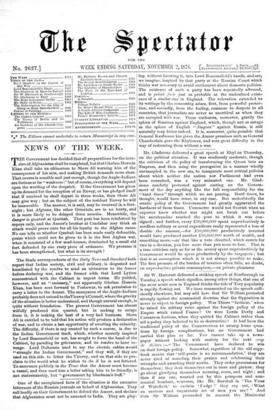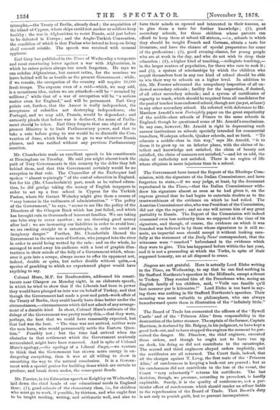Sir W. Harcourt delivered a striking speech at Scarborough on
Tuesday, a speech which signifies, among other things, that one of the most acute men in England thinks the tide of Tory popularity is rapidly flowing out. We have commented on the speech suffi- ciently elsewhere, but may add here that Sir William protested strongly against the nonsensical doctrine that the Opposition is never to object to foreign policy. Was Thiers "factious," when be raised his solitary voice against the foreign policy of the Empire which ruined France ? Or were Lords Derby and Carnarvon factious, when they quitted the Cabinet rather than aid a policy they believed to be so destructive ? It had been the traditional policy of the Conservatives to swamp home ques- tions by foreign complications, but no Government had carried that plan so far. You cannot take up a news- paper without looking with anxiety for the next coup de Mare The Government have declared to win on their foreign policy. Somewhat regardless of the old copy- book maxim that self-praise is no recommendation,' they are never tired of sounding their praises and celebrating their triumphs and awarding their merits. They order processions for themselves ; they deck themselves out in stars and garters ; they go about glorifying themselves morning, noon, and night ; and then if any one, wearied out by this pompous and non- sensical bombast, ventures, like Mr. Burchell in 'The Vicar of Wakefield,' to exclaim 'Fudge !' they cry out, 'What an envious and unpatriotic set of men you are!'" And then Sir William proceeded to recount the Ministerial
triumphs,—the Treaty of Berlin, already dead ; the acquisition of the island of Cyprus, where ships could not anchor or soldiers keep healthy ; the war in Afghanistan to resist Russia, said just before to be defeated in Europe ; and the Anglo-Turkish Convention, the condition of which is that Pashas who intend to keep on living shall commit suicide. The speech was received with unusual applause.



































